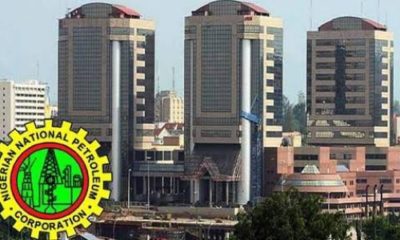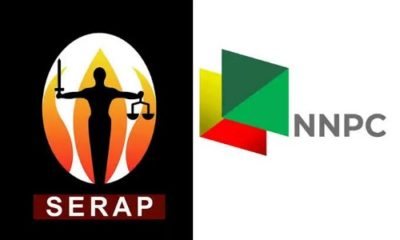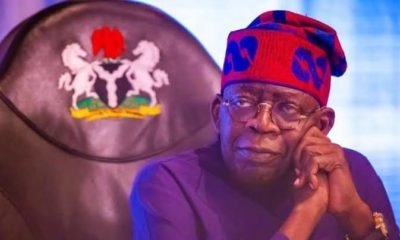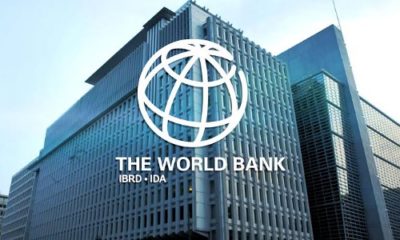Finance
World Bank Backs Buhari To Probe NNPC, Others
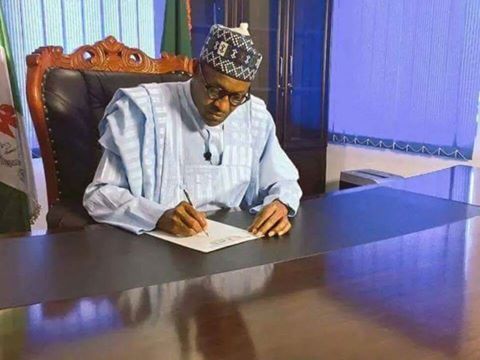
WASHINGTON DC-The World Bank has thrown its weight behind President-elect, Maj.-Gen. Muhammadu Buhari (retd.), to probe the Nigerian National Petroleum Corporation over allegations of missing funds.
“So, the current stand of the government-elect to look into what happened in the past hopefully will have consequences for the future. And those consequences will be that institutions will be stronger; norms will be cleaner and people will not have to steal millions of dollars from the Nigerian National Petroleum Corporation.
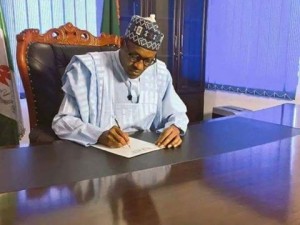 Speaking in a video conference from Washington to journalists from across Africa on the release of the bank’s analysis of issues shaping the continent entitled, ‘Africa’s Pulse’, top officials of the bank commended President Goodluck Jonathan for exhibiting political maturity after the March 28 presidential election that would end the tenure of his administration on May 29.
Speaking in a video conference from Washington to journalists from across Africa on the release of the bank’s analysis of issues shaping the continent entitled, ‘Africa’s Pulse’, top officials of the bank commended President Goodluck Jonathan for exhibiting political maturity after the March 28 presidential election that would end the tenure of his administration on May 29.
The World Bank’s Chief Economist for Africa, Mr. Francisco Ferreira, said looking into financial records of the country, especially allegation of corruption at the NNPC, would check impunity and build public institutions in the future.
He said, “One norm that has to change is the norm of impunity. I am from Brazil myself. So I am also used to a country where people could be corrupt and escape justice. That keeps the people to keep doing it.
“So, the current stand of the government-elect to look into what happened in the past hopefully will have consequences for the future. And those consequences will be that institutions will be stronger; norms will be cleaner and people will not have to steal millions of dollars from the Nigerian National Petroleum Corporation.
“People have alleged in the past that there had been major corruption scandals there. If that stops, then that will have very high returns in terms of the money staying around to be spent on education, health, roads and power that the poor people across the country need.
“So, my sense is that it will be good to promote cleanliness in politics.”
Answering question on some other African countries that have elections between 2015 and 2017, Ferreira said there was no need to be afraid, adding that the fear of elections would drive away investments from the region.
He said the example that had been shown by Jonathan and Nigeria in the just-concluded general election showed that the continent could get it right in terms of transition to new governments.
Ferreira praised Jonathan for political maturity that he exhibited during the elections, adding that if Nigeria could get it right; other countries in the region should also be able to get it right.
Answering a question from a South African journalist on the possibility of the country overtaking Nigeria as the largest economy on the continent given the fall of Nigeria’s main export, crude oil, Ferreira said it did not look plausible.
Also answering a question from an Angolan journalist on who between Nigeria and his country was managing the fall in oil prices better, the World Bank expert said both countries were doing well in putting measures in place to check the decline.
He praised both countries for allowing their currencies to float according to market forces rather than living in denial of the crisis occasioned by the decline in crude oil exports.
Ferreira, however, added that Nigeria stood a better chance to recover faster from the decline because the structure of the country’s economy was more diversified than that of Angola.
The report, Africa’s Pulse, presented by the World Bank Lead Economist for Africa, Punan Chuhan-Pole, stated that sub-Saharan Africa’s growth would slow in 2015 to four per cent from 4.5 per cent in 2014.
The downturn largely reflects the fall in the prices of oil and other commodities, according to the twice-yearly analysis of the issues shaping Africa’s economic prospects.
The 2015 forecast is below the 4.4 per cent average annual growth rate of the past two decades, and well short of Africa’s peak growth rates of 6.4 per cent in 2002-08.
Excluding South Africa, the average growth for the rest of sub-Saharan Africa was forecast to be around 4.7 per cent.
The World Bank Vice- President for Africa, Mr. Makhtar Diop, said, “Despite strong headwinds and new challenges, sub-Saharan Africa is still experiencing growth. And with challenges come opportunities.
“The end of the commodity super-cycle has provided a window of opportunity to push ahead with the next wave of structural reforms and make Africa’s growth more effective at reducing poverty.”
Sub-Saharan Africa is a net exporter of primary commodities. Oil is the most important commodity traded in the region, followed by gold and natural gas, the report stated.
It added that over 90 per cent of the total exports of eight major oil-exporting countries came from the three biggest exports of each country, which represent nearly 30 per cent of their GDP.
Recent price declines are not confined to oil, the report said; adding that the prices of other commodities were now more closely correlated both with oil prices and with one another.
As a result, terms of trade are declining widely among most countries in the region, according to the report, which asserted that the 36 African countries with expected terms of trade deterioration were home to 80 per cent of the population and 70 per cent of the economic activities in the region.
Banking
CBN Denies Currency Devaluation

The Central Bank of Nigeria (CBN) has refuted claims of devaluing the.
Earlier reports suggested that the CBN had devalued the Naira, lowering its exchange rate from N631 to the dollar, compared to the previous day’s rate of N461.60 at the Importers and Exporters (I&E) window.
However, the Central Bank of Nigeria (CBN) released a statement on Thursday through its Acting Head of Corporate Communications, Dr. Isa Abdulmumin, categorizing the report as false information.
In the statement titled ‘CBN Has Not Devalued The Naira’, he said the attention of the apex bank was drawn to the news report by an Abuja based newspaper edition of June 1, 2023, titled “CB Devalues Naira To 630/51”.
However, the CBN stated categorically that the news report was replete with outright FALSEHOODS and destabilizing innuendos, ‘reflecting potentially willful ignorance of the said medium as to the workings of the Nigerian Foreign Exchange Market.’
“For the avoidance of doubt, the exchange rate at the Investors’ & Exporters (I&E) window traded this morning (June 1, 2023) at N465/USS1 and has been stable around this rate for a while.
“The public is hereby advised to ignore the news report by Daily Trust in its entirety, as it is speculative and calculated at causing panic in the market,” the CBN spokesman added.
He, therefore, advised media practitioners to verify their facts from the Central Bank of Nigeria before publishing in order not to misinform the public.
Banking
BREAKING: CBN Increases Interest Rate By 0.5%

The interest rate in Nigeria has been raised to 18.5 percent, up by 0.5 percent, from 18 percent where it was pegged in March 2023.
The Central Banks of Nigeria’s (CBN) Monetary Policy Committee (MPC) resolved to this effect at its third meeting of 2023 in Abuja, on Wednesday.
Governor, CBN, Godwin Emefiele, made the disclosure in the communiqué of the MPC’s meeting, thereafter.
While engaging the media at the end of the two-day meeting, Emefiele, said the committee voted to keep the asymmetric corridor at +100 and -700 basis points around the MPR.
In the view of the MPC, rising inflation rate is traceable to the high energy cost and challenges around the supply chain, among others, which lie outside the corridors of the CBN.
Emefiele said, “The current trend in price development would continue to be monitored by the bank with greater collaboration with fiscal authority to address the drivers of inflation.”
Biztellers reports that the CBN had effected six consecutive interest rate increases, which has seen the rate move from 11.5 percent in March 2022 to 18.5 percent in May 2023.
Finance
Dangers Lurk As Nigerians Resort To Refurbished Gas Cylinders

In Nigeria, people have been forced to come up with creative solutions to cope with the effects of inflation and the economic crisis.
These improvised strategies have not only helped individuals save money, but also enabled them to stay afloat during difficult times.
In a concerning development, the recent trend of boycotting the high cost of cooking gas cylinders in Nigeria may pose a greater risk to lives than it does in terms of saving money.
Economy&Lifestyle investigations have revealed that the soaring prices of gas cylinders have reached a point where it has become increasingly challenging for average households to afford them, let alone refill them with gas.
The situation is further exacerbated by the fact that the pump price of kerosene, which would typically serve as an alternative, has become prohibitively expensive.
Upon investigation, it was found that the prices of gas cylinders vary depending on their sizes. A 3kg gas cylinder is priced at N14,000, while a 5kg cylinder costs N16,000. The larger cylinders are even more costly, with a 6kg cylinder priced at N17,000 and a 12.5kg cylinder costing N19,000.
Additionally, the expense continues when it comes to filling these cylinders with cooking gas, as it costs N2,600 for a 3kg cylinder, N5,200 for a 6kg cylinder, N8,950 for a 10.5kg cylinder, and N10,650 for a 12.5kg cylinder.
Consequently, an average household that needs to replace a worn-out 5kg cylinder would have to come up with N20,250 to purchase a new cylinder and fill it with gas, which can be a difficult feat to achieve.
As a result, many people have resorted to refurbishing their old cylinders and trying to use them as best as they can. However, this approach poses a significant danger.
Mrs. Rukayat Adesoji, a trader, shared her experience regarding her gas cylinder, which had become rusted and could no longer stand upright since last month. Due to the exorbitant prices of purchasing new cylinders, she resorted to seeking the assistance of a welder.
The welder patched the legs of the cylinder, repainted it, and ever since then, she has been using the refurbished cylinder for her cooking needs.
She said ““My gas cylinder which was 6kg got rusted and no longer stands erect since last month. When I asked for the price, I was told it was N17, 500. I was discussing it with a friend who advised me to take it to a welder to paint it and construct a new stand. I heeded to her advice and at the end spent just N3, 000 to turn my cooking gas to a brand new.”
Apart from refurbishing cylinders, some people don’t even know when their cylinders will expire. Mrs. Mercy Opara, a hair stylist, falls in that category as she explained: “I am taking my gas cylinder to the welder to spray it for me. It just cost N1, 500.
“The cost of buying a new cylinder is high. I have been using my cylinder for over 7 years and I don’t even know the expiry date. I just pray God blesses me so that I can buy a new one. But this one I am managing will look neat after spraying it for another two years.”
Mr. Adekanbi Joseph, a wielder, said he paints cylinder and “To paint and rebuild a cylinder stand, I charge N4, 500. Many people come here to paint as a new cylinder is now very expensive to get.”
Highlighting the potential dangers of using refurbished cylinders, Mr. Benjamin Hope, the Chief Executive Officer of FKT Cooking gas and general goods, emphasized the risks involved.
He stated that even a brand new cylinder can pose a risk of explosion if the locks are not properly secured after use or if the cylinder filled with gas is moved from one location to another.
He said “A brand new cylinder can explode if the locks are not well keyed after using and if the cylinder filled with gas was moved from one place.
“There are many reasons for the high cost of gas cylinders in Nigeria. One is the cost of importation due to the exchange rate. Another is the increased migration from the use of kerosene to cooking gas which has necessitated increased demand for gas cylinders. You know that in such a case there will be increased importation of cylinders.”he added

